|
FAQs on Marine Algae Identification 34
Related Articles: Avoiding Algae Problems in Marine System,
Algae
Control, Marine Maintenance,
Nutrient Control and Export,
Marine Scavengers, Snails, Hermit
Crabs, Mithrax/Emerald
Green Crabs, Sea Urchins, Blennies, Algae
Filters, Ctenochaetus/Bristle Mouth
Tangs, Zebrasoma/Sailfin Tangs,
Skimmers, Skimmer Selection, Marine Algae, Coralline Algae, Green Algae, Brown
Algae, Blue-Green
"Algae"/(Cyanobacteria), Diatoms, Brown
Algae,
Related FAQs: Algae ID Visual
Guide, Marine Algae ID 1,
Marine Algae ID 2, Marine Algae ID 3, Marine Algae ID 4, Marine Algae ID 5, Marine Algae ID 6, Marine Algae ID 7, Marine Algae ID 8, Marine Algae ID 9, Marine Algae ID 10, Marine Algae ID 11, Marine Algae ID 12, Marine Algae ID 13, Marine Algae ID 14, Marine Algae ID 15, Marine Algae ID 16, Marine Algae ID 17, Marine Algae ID 18, Marine Algae ID 19, Marine Algae ID 20, Marine Algae ID 21, Marine Algae ID 21, Marine Algae ID 23, Marine Algae ID 24, Marine Algae ID 25, SW Algae ID 26, SW Algae ID 27, SW Algae ID 28, SW Algae ID 29, SW Algae ID 30, SW Algae ID 31, SW Algae ID 32, SW Algae ID 33,
SW Algae ID 34,
SW Algae ID 35, SW
Algae ID 36, SW Algae ID 37, SW
Algae ID 38, SW Algae ID 39, & Marine Algae Control FAQs 2, Marine Algaecide Use, Nutrient Limitation, Marine Algae Eaters, Culturing Macro-Algae; Controlling: BGA/Cyano, Red/Encrusting Algae, Green Algae, Brown/Diatom Algae,
|
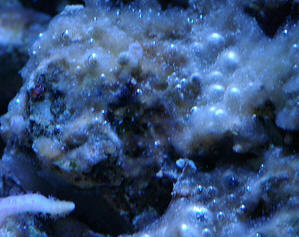
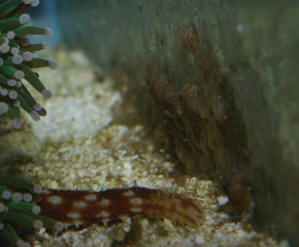
|
|
Mystery Diagnosis
4/1/13
WWM Team,
<Dan>
I am reaching out to you for help with identifying some mystery
"Goo" that is beginning to cover the rocks in my 650 Gallon reef.
I have a feeling it is bacteria related but doesn't look like any
Cyanobacteria that I have seen before.
<Have seen such and looked at under a scope a few times... When I did I
found a mix of BGA, Protists and Sponges/Poriferans...>
Water parameters are PH 8.3, KH 11, Calcium 420, Nitrates/Phosphates 0.
The substance is white, comes off when brushed and grows in the light
(towards the bottom) but not in the shade. It is gelatin like to the
touch and is beginning to cover rock that is on the lower ledges of the
tank. I have attached a picture for your review and if you have any
thoughts on what this could possibly be I could rest a lot easier! Thank
you again!!
Dan Mathews
<I'd encourage you to do as I have done look/see wise... I'd also be
pro-active in slowing its progression. Will cover, smother attached
life/livestock. What is your ORP? Do you use Ozone? I would... Bob
Fenner>
|
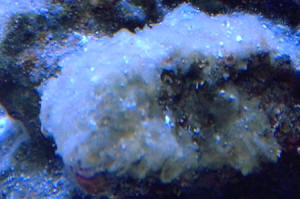 |
Re: Mystery Diagnosis
4/1/13
Thanks Bob!
<Welcome Dan>
To be honest I never looked at / tested ORP and do not use any ozone.
<Ahh, with a tank of this size/volume and what you have investigated in
livestock, I definitely would>
After reading your message I did my research and now understand whats
behind your advice. I will have to pick up an ORP tester on Monday and check
on the ability of the water to cleanse itself. Just for more context, my
current 650 gallon reef is the consolidation of two reef tanks (90 and 92 g)
I had before I recently moved.....so my current tank is only about 8 months
old. I use all the usual gear for filtration..skimmer, Chemi-pure, Refugium
with a lot of Macroalgae but after reading about ORP it seems there is more
to the equation then just that. In terms of bio-load, I don't feed my fish
any commercial food since my only fish are 3 tangs (Yellow, Purple, and
Achilles) that I had for the last 5 years.. so I only clip Gracilaria and
Ulva that I get fresh from Kona every two weeks through indo-pacific sea
farms
<Ahh, know IPSF, and had places mauka of Kailua and down Ali'i Drive... and
up in Waikoloa... had hoped to be living on the Big Island by now...>
to try and minimize introducing phosphates and silicates. (I have two
clownfish as well but they hunt on their own, eating pods and baby shrimp).
I bring this up because even though the standard tests say my water
parameters are within range, and my bio load doesn't seem that high, I
*feel* something is up.
<Agreed>
I thought a bigger tank would be easier but it just presents its own set of
challenges. Bob, thanks for pointing me in this direction..now at least I
have an action plan.
Thanks for helping to protect my reef!!! (Picture Attached)
Dan
<Very nice. BobF> |
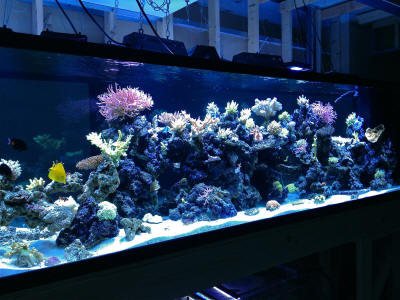
Re: Mystery Diagnosis, algal plus mess
4/1/13
Thanks Bob!
<Certainly Dan>
I actually came back from the Big Island on Saturday since my 6 year old
daughter wanted to see a "real" school of yellow tangs for her spring break.
<Ahh!>
There is no faster way to get a child hooked on the ocean than a day with
the fish at Kahalu'u Beach Park and then food at "Da Poke Shack" on Ali'i
Drive :-) I've dived the Great Barrier Reef and Caribbean but nothing makes
my knees weak like seeing the large schools of yellow tangs at the City of
Refuge
<Ah, Two Step immediately to the north is a treasure... and of course Cap'n
Cook's, and, and...>
and it really reminds me of the responsibility we have to really care for
these amazing creatures. I would say I hope you can disappear to the Big
Island soon but all of us need your wisdom too much Bob... :-)
(Sorry for the digression :-) Being in Hawaiian waters is almost a spiritual
experience for me so I get carried away)
<Understand>
Thanks Again so much!
Dan
<Cheers, BobF>
|
|
Narrowing down algae identification
4/1/13
Hi,
I was hoping you could point me in the right direction. You've
helped me recently battling a Cyanobacteria invasion. Right now, I
do not have any obvious Cyano on the sand or rocks, it's been dwindling
and have not had to siphon the sand in a week or two. I would
guess there is still Cyano in there but just not enough to be obvious.
The pink Fiji sand is not making it easy to tell. The tank is 55
gallons and I'm still changing about 7 gallons of water a week.
Ammonia and nitrites are 0. Nitrates are either 0 or a tiny smidge
above depending on who you ask to read the test kit and what kind of
light they are using. I've added a medium Aquafuge 2 with 20
pounds of live sand which gives me a small DSB ranging from 4 inches at
one end sloping up to 5 inches at the other end.
<Ahh, these should help in time>
I have CPR's 24 watt PC light fixture on it and some Chaeto that is
growing plus a few critters. I'd like to give a shout out to CPR
for making a well done product. All of the display tank lighting
is now LED's with the latest addition being a pair of TMC AquaRay
Aquabeam 600 "reef white" Ultima's on one side of the tank where the
other side has the pretty nice but older LED fixture meant for corals.
<Very nice indeed>
I have to do a quick touch up with magnetic scrubber on the glass maybe
once a week. There are still just one Coral Beauty, the Lyretail
Hawkfish and one Blue Green Chromis.
What I have now is best described a pink translucent fuzz growing on the
tops of the rocks, the backs of snails and on the tops of the power
heads and tubing. The fuzz is 1/16th of an inch tall. It is
growing out of either dark green/brown/red looking "plugs" depending on
how you look at them so in reality, the pink fuzz is most likely green
or brown but made to look pink because of the lighting. It is some
very tough stuff, you can not scrub it off with a tooth brush.
Snails eat it.
I've included a picture. There is also a similar looking photo on
http://www.wetwebmedia.com/maralgidf23.htm "Re: Algae ID...
time, past, for a scope -- 07/08/08 " but I can't tell the
scale.
The higher up in the tank you go, the more there is. It is some
type of algae for sure which means I've still got work to do on nutrient
control but....is it some sort of Cyano or is this just what has pushed
the Cyano out?
Thank you!
Paul
<Can't tell from looking here; but I would just keep on the path you're
set on... this too will go in time. Cheers, Bob Fenner>
|
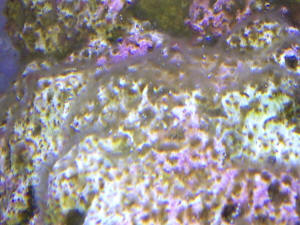 |
Re: Narrowing down algae identification
4/1/13
Thanks.
I had a feeling identifying with a description and a questionable photograph
would be a challenge.
<Heeeee! Oh yes... see WWM re algal IDs... had a few courses in
phycology/algology in college... have to look/see under a 'scope, test for
storage food type/s, light capturing pigment type/s.... Can't tell by
colour, gross appearances>
A friend of mine does bird watching and I asked what kind of bird was in the
back yard. She looked and said it was a LBJ.
<Lyndon B. Johnson? "Believe me or I'll tan your hide!">
I'd never heard if that and asked what it stood for. She responded "Little
Brown Jobbie". You need something like that for algae.
<Mmm>
I'm going to watch the fish now. The tank is increasingly looking
like a patient in the ICU with lots of tubes, wires and plastic machines all
neatly organized and humming along with a bill that will make your hair
stand on end. Enjoy and have fun today.
Paul
<Thank you Paul. You as well. BobF> |
|
some algae ID please 12/3/12
Hi. 3reef seems stumped and I was directed here.
Linking a pic and a video (photobucket) for reference.
This stuff followed a Cyano outbreak. The tank is over four years
old.
Param.s are solid and nasties are 0 (measurable) though they are
probably tied up in this growth.
<Assuredly, yes>
Calothrix was suggested but it doesn't really fit the description, it's
not as stringy. iodine test showed no starches
Haven't been able to ID the source. Changed all filters in all
stages of RO/DI (even though was 0 TDS) to be safe. Have added a
green clown goby.
Otherwise, no additions in a very long time.
it's slimy, disintegrates when you take it out of the water, almost
bulbous looking.
<Have seen this sort of mass/mess many times in wholesale LR curing
operations... and under a scope; it's a mix of Dinoflagellates, some
browns (Phaeophytes), Cyanophytes, and other Monera, Protistans... >
The directory of pics
http://s449.beta.photobucket.com/user/Peredhil_photo/library/Aquarium/Algae
Some highlighted pics and a video
http://i449.photobucket.com/albums/qq219/Peredhil_photo/Aquarium/Algae/F8619
66E-BA90-496C-8560-670F3CD89F59-12096-00000F63331534FB.jpg
http://s449.beta.photobucket.com/user/Peredhil_photo/media/Aquarium/Algae/5A8BBEBD-C021-4F31-8BCE-CC506E91496D-12096-00000F6350E45A2D.mp4.html
Thank you!!! Any help appreciated.
ID is most important, tips for getting rid of it appreciated too.
<Dumping all the water out, rinsing off most the biomass, doing what one
can to restrict nutrient availability, using competitors, algal
predators... the usual assortment of techniques gone over and over on
WWM. Bob Fenner>
Jason
|
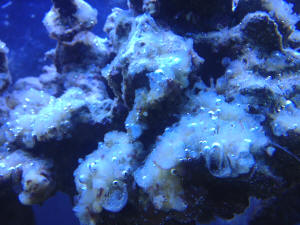 |
|
Help identifying and treating this stuff … ? algae
11/9/12
Hello All
I have a 250 red sea max that has been running for the past 6 months.
<Nice units>
Lights have been changed to LEDs. I upgraded from a 30g Biocube.
Original inhabitants were a yellow and blue tang. I added in a few
mushrooms, xenia, bubble coral, and frogspawn 3 months ago. They have
all been doing well. 4-6 wks ago I added in a hot pink bubble tip
anemone (small about 1.5 inches in diameter) and a few fish (glass
cardinal and a pair of orange and black clowns-after quarantine).
Now my tank is covered in a web like substance that I suspect is some
kind of algae.
<Yes; most likely Dinoflagellates; though could be a considerable amount
of diatoms, even blue-green/Cyanophytes>
I may have gotten a little excited about all the new fish and may have
fed them a little more than I normally do. I feed them formula one
pellets and a very little bit of brine fish. The anemone gets a tiny
piece of shrimp that I cut up. I got a goby and 4 more Turbos to try to
control it, but it does not seem to be working. The stuff looks like
spider webs. It seems like its getting worse. At first I read about
worms that may do this but it is too extensive and it has bubbles all
over it.
<Not worms; but the only way to discern what groups of algae are here is
microscopic examination>
The sand looks a little better after adding the goby, but the sand it
kicks up seems to make the rest of the tank look dirtier as it sticks to
the algae.
Please let me know what I did wrong,
<Mmm, not likely much... this is a sort/path of "maturing" of a new/er
system>
how to fix it and prevent it from happening again.
<You've a bit of reading... Start here:
http://wetwebmedia.com/avoidingalgaeproblesm.htm
and on to the embedded links... the linked files at top>
My poor bubble coral went from being a pretty white to a brownish color.
I assume this is due to the algae growing in/around it. Will it change
back?
<Hopefully>
pH 8.4, KH107.4 (added buffer), nitrate 0,phosphate 0,
<... your corals, other photosynthates need measurable NO3 and PO4>
sp gr 1.025-.026, 80 degrees...
Thanks in advance. I had a beautifully clean tank full of coralline. I
am hoping to see it again.
Alice
<Get reading... write back if your options are not clear. Bob Fenner>
|
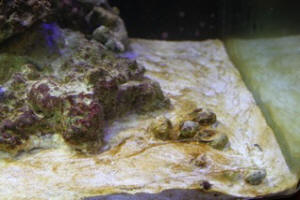
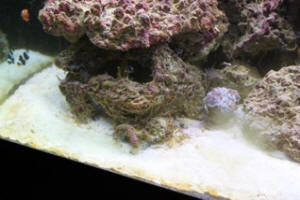
Algae ID
11/1/12
Hey guys!
sorry of the pic is large sending email from iPhone.
<Tis fine size wise, but poorly resolved>
Anyways, I'm having trouble with a very light/lime green fuzzy/hairy algae.
(I checked your algae id page couldn't an id) I've dealt with the normal
dark green algae before and this seems to different. Number one it is very
easy to just brush away, number 2 my phosphate and nitrates cease to exist.
<Likely being taken up by the life here, including this algae>
I have recently within the last month -2months changed out my t-5 bulbs
since I've had the others for a year. I know that new bulbs can sometimes
cause nuisance algae. But this just seems to maybe be something else. Any
suggestions?
<...? Yes; read here:
http://wetwebmedia.com/avoidingalgaeproblesm.htm
and the linked files where they pertain... You/I can't tell what algal group
is involved here w/o microscopic examination... this may be a
Green/Chlorophyte, a Blue/Green/Cyanophyte, or.... color alone is not
definitive>
I also do 10g water changes weekly (75g mixed reef), I've turned the lights
off for 2-3days with a water change. Just seems to keep coming back.
Also am getting a Nasty dark brown algae in my sand, not red slime!
Thanks guys!
<"Many roads..." lead not only to Rome, but to understanding of nuisance
algae issues... Read on! Bob Fenner>
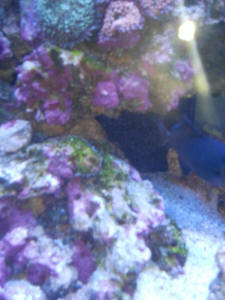
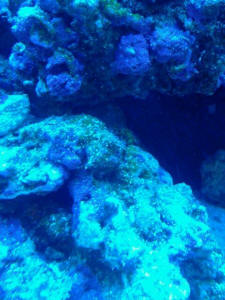 |
Orange spots ID... new SW tank
10/25/12
Hello! I have a saltwater tank with live rock and live sand and T5's. I added a
few snails and hermit crabs to the tank roughly a week ago and yesterday I
noticed a lot of Orange spots on the sand and on the rock. Do you know what this
could be?
<... likely an algae of some sort; but this can only be a guess given the info.
presented. Bob Fenner>
Thank you, Andie
Re: Orange spots on sand; algal ID f' 10/25/12
Thank you so much!!
<Don't be concerned re these (likely) Diatom algal colony growths... they're
part of the process of breaking in a new system. BobF>
|
algae identification 10/1/12
Hello WWW Crew,
<Javiera>
I was wondering if you could help me identify the following algae. I
searched de web, it looks very similar to Chaetomorpha, but not exactly.
<Mmm, can't make this out well enough other than to state that it appears to
be a filamentous green/Chlorophyte...
I see by your contact info. below that you're associated w/ a
university; do you have access to a copy of "How to Know the Seaweeds" by E.
Yale Dawson? I'd ask a reference librarian in your school for help here, and
a professor for use of a dissecting 'scope for a closer view.
Thank you,
--
Javiera Echenique Berton
<Welcome. Bob Fenner>
|
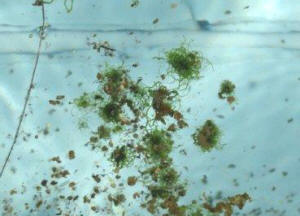 |
Re: algae identification
10/1/12
Thank you for the help!! I will look for the book.
Javiera
<Real good. Nos vemos. BobF> |
Help! Ich? Prelude to disaster, now
alg. ids
Bob, hm, wonder if there is a root cause in the "algae"...having ignored
this problem due to managing the disease but now giving it more focus...
Can I trouble you to review the attached pictures/video of the "algae" in my
tank?
<Ok>
You will see: flakes that slough off and rest (grow?) on nearby PVC pipe,
the pest growing on substrate and rocks, short/stocky filaments waving in
the water column.
I am having difficulty identifying what this could be - algae, diatom,
cyanobacteria all seem doubtful. Any thoughts?
<Could be any/all of these>
I assumed that nuisance algae issues were occurring due to the / crypto-pro
dosing and didn't pay much more attention to them over the last few months.
<The Cu should have killed all off... one last time (for now!); "don't treat
in display systems". B> |
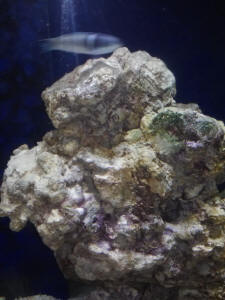
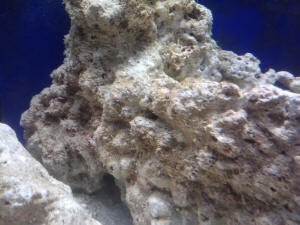
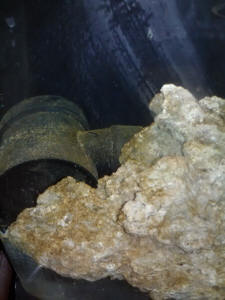 |
|
algae ID 7/20/12
Hello!
<Good morning Dave.>
Could anyone hazard a guess on the identification of the 2 little buds
of algae on my rock, and the 3rd similar one between the Neomeris and
Halimeda? They are very tiny, and at first I thought it was a Caulerpa
nummularia, but now am wondering if it’s actually an Acetabularia.
<Can be a tricky distinction from a single picture.>
There is no sign of a rhizome, and each one seems like a separate “plant”,
however the two close ones have a very short “stalk”, while the other
has a longer stalk.
<Lack of rhizomes eliminates the Caulerpa.>
There are several on different parts of the rock which also have a longer
stalk. Just trying to decide whether to let it be or start scrubbing!
<From the picture and description, I believe you have an Acetabularia
sp. I'd let it be.>
Thank you,
<Welcome>
Dave
<Jordan>
|
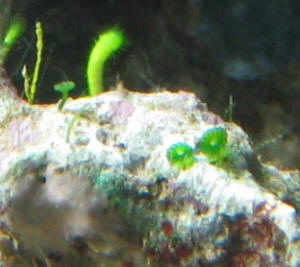 |
|
Unknown Saltwater Plant???
6/20/12
Hi,
<Afternoon Bill>
I noticed this specimen growing in my Reef Tank about 3 Days ago....
I believe that it is a plant of some sort.....
<Yep.>
I have no idea what it is, where it came from, or obviously if it is a
positive thing or should I remove it as quickly as possible.....
<A very small piece likely hitch-hiked in.>
I know that the pic is not the best, but I have included one.....
Any ideas???
<Appears to be a species of Caulerpa. I am fairly certain it is C.
racemosa based on the circular fronds and rhizoids; a more defined
picture would eliminate any doubt.>
BTW - The tank has been up for 2.5 Years... 50 Gallon Sea
Clear System II.... SG is 1.025, Zero for Nitrates, and unable to
get a reading for Phosphates.... Water Temp has been a little high
at 78.9 F....
I have not introduced any new inhabitants for at least 3 Months, or Live
Rock for approx. 9 Months.... No Refugium.... Protein
Skimmer, External Rena Filter XP4, and Power Heads
for moderate flow
Any help would be appreciated.... Any ideas???
<I would remove it but that's your call. Read more on Caulerpa--
http://www.wetwebmedia.com/ca/volume_6/volume_6_4/caulerpa.html
http://www.wetwebmedia.com/caulerpaalg.htm >
Thanks!!!
<Quite welcome.>
Bill
<Jordan>
|
 |
Re: Unknown Saltwater Plant???
6/20/12
Hi Jordan,
<Hello Bill>
Just wanted to Thank-you for the quick response....
<Anytime>
I will yank the offender ASAP....
<Sounds like a plan, be sure to remove all of the rhizoid.>
Tks!!!
Bill
<Jordan> |
Cyano ?
3/12/12
Hi
A couple of months ago i sent in a picture and Bob said i had Cyano on
back wall of tank.
I have been fighting it since.
Increased water circulation 50% and reduced nitrates to 0.
I was scraping a little the other day and it comes off like flake fish
food. It actually looks like red flakes now too on tank wall.. Could
this be it dying maybe?
<Mmm, maybe... coming off in flakes doesn't "sound"
like Cyano... is this stuff slimy? BGAs are invariably so>
Frightened to scrape it as i tried this last time and fish were eating
it and a few died.
<Oh!>
Is this Cyano as i keep being told i should be able to either peel it
off or just hoover it up.
<I'd hoover while peeling>
Not this stuff. Scraping the only way.
Your thoughts appreciated as always.
Thanks
Gary.
<Again, I'd take a look under a scope... BGA being Monerans,
don't have nuclei.... definitive. BobF>
Re: Cyano ?
3/12/12
Thanks Bob
Not slimy at all but did look bubbly in parts.
If anything it just looks so dry, like flake and scrapes like dry
paint. Red in colour.
I tried hoovering while scraping but didn't have great success.
It is only on back wall of tank. Nowhere else.
My tank has grates on back wall where the water is sucked through.
This is where the main problem is.
Don`t know if any of this helps at all.
Gary
<Mmm, not much more. Again... microscope. B>
|
ID Help, Macro or Bubble? 12/14/11
Hello to the good folk of WWM!
<Hello Rey>
Can you help identify what type of Macro Algae or Bubble Algae I
have growing here? Its growing on several different rocks.
They are very small, maybe the size of a small chocolate chip and
shaped like a leaf. Very soft to the touch. Anything to worry
about or will it run its course?
<Some Rhodophytes have also been dubbed by some as Red
Valonia, but your macro algae appears to be a Rhodophyte,
Botryocladia skottsbergii. I'm not sure if they spread like
Valonia so I will ask Bob for his input in this regard.>
<<Not nearly as robust, invasive as Valonia.
RMF>>
Thanks!
<You're welcome. James (Salty Dog)>
Rey
|
|
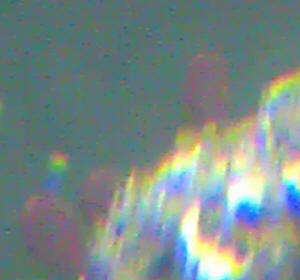 [1]%20crop.jpg)
|
|
Dear Bob,
Hope you can help. I have a 600l mixed
reef that is running smoothly apart from what I can only describe
as reef snot! I repeatedly get a covering of this mucus type
stuff on several rocks. I have attached a photo, however it is a
light brown in colour and occasionally forms bubbles. It is
loosely attached and easily syphons out but generally regrows
quite quickly within a couple of days; occasionally it may take a
week to regrow, but always seems to come back. If left, it will
grow into large globules and strings that sometimes detach in the
flow. The problem started a couple of months back.
Do you have any idea what it is and
how i can get rid of it? I suspect it could be some kind of
bacterial algae?
Some info about my reef if it helps:
It has been running approx 2 years and is a standard Berlin type
system with mature rock. I utilise a good quality protein skimmer
which is slightly oversized and iron based phosphate remover in a
Deltec fluidiser. Flow is moderate to strong using Tunze streams.
Magnesium, calcium and KH are kept in check with balling lite
using Fauna Marin salts apart from KH for which I use standard
bicarb of soda from the local cash and carry (£4 for
3kg!)
Water parameters are good and stable
with nitrate and phosphate being unreadable on Salifert test kit
and a Hanna tester. I've attached a general photo of the tank
for reference.
Many thanks and best regards,
Ian, by email
|
|
 |
Ian, I have seen, even personally
experienced this sort of light brown coloured slime
issue'¦ and taken a look at bits of it through my handy
dandy Mattel-Intel QX3 microscope. As far as I can tell, most of
the life here is/was Dinoflagellates'¦ single celled
algae with whip-like and a girdling flagella (for
locomotion)'¦ along with a mix of other algal groups
members, Protists'¦ There are a few standard approaches
to limiting such growth. These include nutrient limitation
(through good skimming which you have, use of some chemical
filtrants, water changes, gravel vacuuming, the use of in-place
and remoted DSBs/Deep Sand Beds'¦) and nutrient
introduction prevention (rinsing frozen/defrosted foods, using
foodstuffs that are discrete and completely digestible and
palatable so that they're consumed'¦). Importantly,
attention to raised and sustained RedOx (covered in an article in
this issue of UM, do read this) perhaps through the introduction
of Ozone, or other means e.g., increased pH, above 8.5 during the
day, low of 8.3 during the night. All these are activities that
favour other organisms that will out-compete noisome algae for
nutrients.
You mention the possibility that this
mass is bacterial algae, likely referring to Cyanobacteria or
Blue-green algae. Both Dinoflagellates and BGA are indeed slimy,
and the latter does occur in several colours, though rarely
brown. Determination of group can be readily determined by
microscopic examination; the BGA being Monerans and like bacteria
lacking nuclei and having but one circular strand of DNA.
You also note the age of the system
and that it is well-established. I encourage you to either add,
or renew some part of your live rock here'¦ this will
add to RedOx, and replenish your likely depauperate mix of life
on and in the rock and substrate. The ecological improvement will
also grant you relief from the brown slime problem.
The lack of detectable nitrate and
phosphate are telling'¦ these nutrients may be being
taken up by the undesirable biota here, or may be dangerously
limited, otherwise unavailable to your purposeful livestock here.
To put this bluntly, I would be pro-active in reducing, ridding
your system of the brown slime.
|
Green Hair Algae 11/26/11
<We require that people send files of no larger size
than a few hundred Kbytes. See WWM re Chlorodesmis. Bob
Fenner>
For a almost 6 months we've been losing a battle to
green hair algae. Our 250 reef tank had been doing well
until the back of the glass was covered with hair algae.
Not thinking/realizing it was time to add more to our CUC,
we scraped the back glass ourselves and the hair algae
attached to the rocks. We tried manually cleaning the rocks
but the few threads we missed clung to new rocks and
continued to grow. When I have browsed your website, the
closest algae to ours appears to be turtle weed. I'm
attaching
pictures to see if you could please help us identify our
hair algae. Our magnesium was low (1120) and our nitrates
were at 10. We are raising the magnesium and continuing to
run carbon and phosphate removers. We have added additional
types of macro algae to our refugium, changed our lights,
reduced the light period of our MH to only 6 hours but
still have the VHOs on 4 hours prior to the MH and 4 hours
after the MH. We have also reduced feedings and recently
added snails (Astrea turbo snails). We had been
trying to use Mexican Turbos but hadn't had much luck
with them. No one wants to eat it and we can't seem to
kill it. Any type of ID help would be greatly appreciated.
Thanks for your help and guidance.
|
|
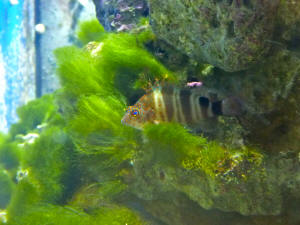 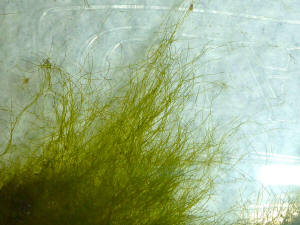
|
Re: Green Hair Algae 11/26/11
Here are the smaller images, I will check out Chlorodesmis.
Thanks
<Ahh; I/we thank you. The 50 Megs of space our email has
was past 76% full>
For almost 6 months we've been losing a battle to green
hair algae. Our 250 reef tank had been doing well until the
back of the glass was covered with hair algae. Not
thinking/realizing it was time to add more to our CUC, we
scraped the back glass ourselves and the hair algae attached
to the rocks. We tried manually cleaning the rocks but the
few threads we missed clung to new rocks and continued to
grow. When I have browsed your website, the closest algae to
ours appears to be turtle weed.
<Ah yes>
I'm attaching pictures to see if you could please help us
identify our hair algae. Our magnesium was low (1120) and our
nitrates were at 10. We are raising the magnesium and
continuing to run carbon and phosphate removers.
<Hopefully these won't starve other live, your
livestock here>
We have added additional types of macro algae to our
refugium, changed our lights, reduced the light period of our
MH to only 6 hours but still have the VHOs on 4 hours prior
to the MH and 4 hours after the MH. We have also reduced
feedings and recently added snails (Astrea turbo snails). We
had been trying to use Mexican Turbos but hadn't had much
luck with them. No one wants to eat it and we can't seem
to kill it. Any type of ID help would be greatly appreciated.
Thanks for your help and guidance.
<Welcome... do consider a (remoted) DSB as well. BobF>
Re: Green Hair Algae 11/27/11
Thank you so much for your response. I'm really perplexed
to how we have turtle weed growing in our tank. Besides
installing a remote DSB are there any other suggestions you
might add?
<Mmm, the usual trials for potential predators, other
means of nutrient deprivation... Read here:
http://www.wetwebmedia.com/marine/maintenance/maintindex.htm
scroll down to the Algae Control tray... BobF>
None of our fish will eat it but it seems like some of the
Astrea snails are working on it. I have ordered some Mexico
Turbos to see if they will help too. Any other suggestions?
Thank you again. |
|
|
Algae id, 10/29/11
Good evening,
<Hi>
Can you help me with an id on this algae? What kind does this
look like?
Thanks
Rob
<Looks like Cyano with maybe some diatoms mixed in. See here
for more http://www.wetwebmedia.com/bluegralgae.htm
.>
<Chris>
|
|
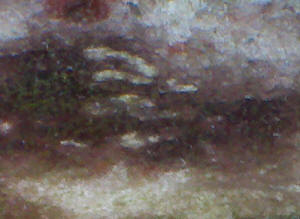
|
|
Algae Identification -- 10/12/11
Hello Crew,
First off, thanks for all the years of being here for us!
<Welcome>
I noticed this form of algae popping up all over my live rock
over the last week. The only algae it resembles at all to me is,
Acetabularia acetabulum (mermaid's wine glass).
Can you please help me identify it and let me know if it could
take over my tank. The algae is white with a green stem hard to
the touch, looks like a daisy, and does not retract when touched;
but the flower (as I'm calling it) portion of it falls off if
I try to move it back and forth.
My reef tank is 30 gallons with a 20 gallon sump. I am running a
CPR Aquafuge Small and a protein skimmer.
Here are a couple of pictures of the algae:
Thanks Again,
Nick
<Mmm, I think this is an Octocoral of some sort... A
Clavulariid... Do see the Net re... Bob Fenner>
|
|
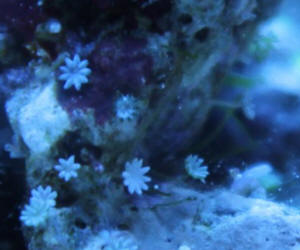
|
Reef Tank Fuzzies
9/12/11
Hello Guys,
<Babak>
I have been having quite a time trying to figure out what's growing
on one of my coral skeletons, it resembles green hair algae yet has no
color or is perhaps white or grey and seems to branch in some
places.
<Mmm, digitate... likely is an algae of some sort... Really need to
look at under a lowish power microscope to tell for sure>
Does anyone have any idea what this is? I was told that it may be some
type of sponge but I don't feel
that's right.
<Not likely a sponge if very flexible... Algae come in all
colours... yours is likely a blue-green/Cyanophyte... See WWM re,
including limiting nutrient, other means of control. Bob Fenner>
Thanks,
Bob
|
Re Pest Anemone/Aiptasia ID, now algal
mat ID 7/31/11 - 8/1/11
Thanks for the confirmation, James.
<You're welcome.>
I got a Magnesium test today. First test came out at 1450. It
appears that is close to normal...I'm still reading up on
Magnesium in general.
<I would not let this get any higher and lean toward a range
of 1250-1350ppm.>
<There will be a magnesium article in our latest issue of WWM
Digital Magazine which should be released very shortly.>
I'll test tomorrow just to ensure there was no operator
error. Also, I attached a few more pics of the algae
'mat' I have on my live rock. No problem if you can't
ID it.
<I see no pic attached but no need to resend, just concentrate
on lowering your nitrate level.
May want to read here. http://www.wetwebmedia.com/nitratesmar.htm
>
I think I'm going to work with a lemon juice or vinegar
solution before buying any chemical additive for the Aiptasia.
Thanks, again for your time.
<You're welcome. James (Salty Dog)>
Re Pest Anemone/Aiptasia ID 7/31/11 - 8/1/11
Oops, sorry Adam, I do see the pics. Mistakenly looking for them
on the reply page which will not show attachments. Cannot
identify exactly, but a common mat type algae that generally
develops within newer systems and should disappear as you lower
your nutrient/nitrate levels. You may also want to hire a few
more hands for your clean up crew.
James (Salty Dog)>
|
|
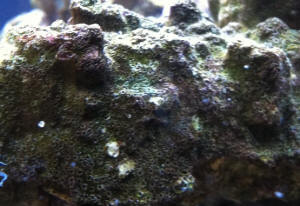
|
|
Is this bubble algae?/what kind of
coral is this? 7/15/11
Hello everyone at WWM,
<Tim>
I got this Zoanthid about 7 weeks ago at my LFS for $5.00. I had
it on a rack and just moved it on to a rock. Is this bubble algae
to the right of it?
<Mmm, yes>
I have never had that type of algae. I have not glued the piece
yet so I can take it out and remove if that is what it is,
don't want it spreading.
<Mmm, see WWM re Valoniaceans>
I also heard that it is easier to remove if the bubbles are
bigger. In the second picture I won this at a frag swap and
forgot to ask what it was.
Is it Favia?
<I do think it is of this genus, yes>
Thanks for your help it is much appreciated.
Tim
<Welcome! Bob Fenner>
|
|
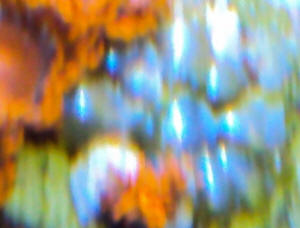 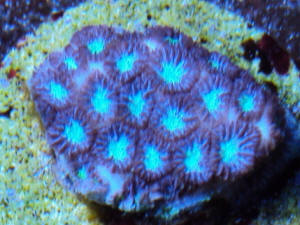
|
|
Clearish Dinoflagellates? 6/7/11
Good Morning Crew,
I have what appear to be clear to white dino's all over my
rockwork.
<Mmm, maybe>
Tank is a 58 gallon w/ a Tunze 6045 and 6025 for circulation,
BM100 v2 skimmer. It's long and gets bubbles on it, has a
slimy texture,
<Here's a clue...>
and has spread everywhere. Tank is a mixed reef. The best way to
describe it is it has the appearance and texture of snot, with
some bubbles. I feed mainly NLS pellets, which rarely do any go
uneaten. It's been around for a couple months, and
doesn't show any sign of going away. Scrubbing rocks
hasn't helped. Any ideas what this is? I'll attach a
picture.
Thanks,
Seth
<Likely this is a mix of species/organisms... the slimy
component Cyanobacterial... Need microscopic examination, perhaps
some simple to not staining to define... But the usual
approaches: nutrient limitation,
removal, competition and predation... See WWM re algal control,
are your guide to reducing, eliminating this mess. Bob
Fenner>
|
|
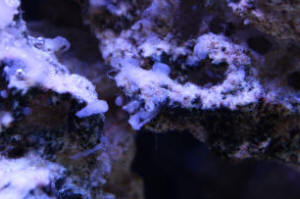
|
|
Hair turning red 4/30/11
Hi,
<Ian>
I have visited your site many times and always found the answers
to my questions amongst the pages. It's been really helpful
as I've only had my tank 6 months and everyday seems to bring
a new question! Anyway, I searched for an answer to my latest
query but could find none so I am writing to you today.
<Ok>
My 24g marine aquarium is going fine and water parameters have
been stable and good for some time now. Ammonia, nitrite are zero
and nitrate and phosphate as near to zero as possible (less than
1ppm each). Ph varies between 7.9 and 8.1 depending on time of
day and specific gravity is 1.023.
<I'd raise this... see WWM re spg>
I have a few different corals which seem happy
but I notice that one of them is growing
red.
<... Do you mean the algae here?>
By that I mean the new growth is red. When I bought this I was
told by the LFS that it's maiden's hair. You can see it
in the first attached picture.
Is it supposed to be red or is this some kind of Cyano growth? I
would say some bits have doubled in length in 2 weeks but all the
new growth is red.
<Yes>
A second patch has grown all by itself on a piece of rock that
another coral came with. I've attached a picture of that too
as it doesn't seem to be growing red at all. Is this second
one also maiden's hair or is it something different?
<Just more resistant for now>
In which case is it desirable or not? It looks more fern-like to
me.
<This is a Chlorophyte, a green algae, being overgrown by a
type of encrusting Red Algae...>
Kind regards and thanks in advance,
Ian
<Welcome. Bob Fenner>
|
|
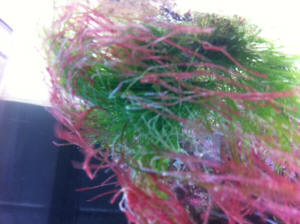 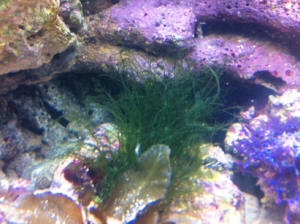
|
Re: Hair turning red 4/30/11
Hi again and thanks for the super-quick reply!
<Welcome>
Apologies for asking too many questions in one sentence but does
your answer "yes" refer to it being normal to be red or
to it being a Cyano growth?
<Sorry for the lack of clarity. This green growth is an algae,
not a coral, and the one patch is being overgrown by a
Rhodophyte... a red algae, NOT a Cyanophyte. B>
Kind regards,
Ian
|
Re: Hair turning red 5/2/11
Hi once more,
<Ian>
After the clarification I decided to give the algae a
"hair-cut" to remove the red-encrusting ends.
<Mmm>
I did this in the presumption that the red was not
desirable but with hindsight I'm not sure why I thought
that. Was that a correct assumption - that the red
encrusting algae is bad?
<Is not "bad" for your system... a bit of
natural succession. Is bad for the "maiden hair"
algae... in that it will slow down its growth
somewhat...>
There seems to be a lot of conflicting opinions on the
internet regarding this and I'm not sure which to
believe.
<Then do nothing till you understand>
Anyway, whilst attempting a hair-cut a crab scuttled out
from underneath.
It's about 2.5cm across and seems to have lost a claw.
The nearest thing I can find on your ID pages is
Lissocarcinus laevis
<Nah>
but I cannot find information about whether or not he is
desirable in a reef tank with fish and other invertebrates.
I have attached a photo.
<Most Decapods are not... if this one isn't doing
any apparent damage, I'd leave it be; enjoy it>
Kind regards,
Ian
>And you, B<
|
|
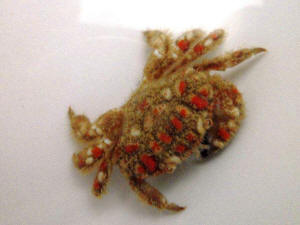
|
|
|
Algae ID 3/24/11
Hi,
I have enclosed pictures of algae I am facing in my aquarium
<... I see these>
Appreciate if you help identify it.
Thanks
Steven
<Uhh, can't identify, even to Division (eq. to Phylum in
Zool. Taxonomy) this life... Might be a mix... likely at least in
part BGA/Cyanobacteria. Do you have access to a 'scope of a
few hundred power? Read here:
http://wetwebmedia.com/marinvind1.htm
the third batch down... Bob Fenner>
|
|
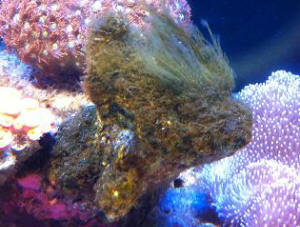 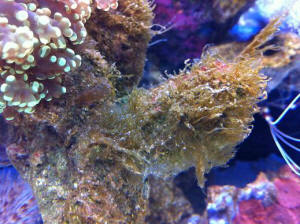
|
Identifying very young anemone (Aiptasia?)
3/21/11
I have something resembling Aiptasia sprouting out of my young live
rock.
I read Bob Fenner's excellent article on Aiptasia here, and learned
a lot.
But looking at pictures and reading descriptions is not a good way for
a person like me, who does not know what to look for, to identify
something.
I wonder if there are definitive characteristics of young anemones.
<Mmm, yes... the shape, size of tentacles; if these vary... the
mouth, shape/size of column, presence of verrucae, stickiness,
colour...>
Actually, if this is an anemone of ANY type I don't want it in my
FOWLR tank, right?
<Likely so>
On the other hand, even though I can easily pull the rock and pour
boiling water on the thing, I hesitate to indiscriminately kill
anything.
It has the characteristic light brown, almost translucent tapered
tentacles, about 3/4 inch long right now, growing slowly.
But there are several things about it that don't quite fit:
1) The anemone photos show a large tube with the tentacles surrounding
the edge of the tube. But this thing has no such tube. All of the
tentacles radiate from a single holdfast on the surface of the rock. Is
this how a young anemone looks, or does this rule out an anemone?
<Could be an Anemone... or a Zoanthid... or a single stony coral
polyp that has yet to generate much of a skeleton...>
2) There are several of them nearby. One has about a half-dozen
tentacles, one is just a single tentacle attached to the rock, and
another is just two. Do young anemones start out this way?
<Some can>
3) I read that they have a 'pull back' reaction if touched. But
I lightly prodded it with a plastic probe and it has no reaction at
all.
<Some species are relatively insensitive to touch>
What do you think? Should I watch and wait? Or just pull the rock and
hit it with boiling water?
Thanks! Tim
<I'd wait, observe, enjoy for now. Unless these animals are
obviously stinging your fish livestock, they're not likely trouble.
Oh, do send along some well-resolved photos when you can. Bob
Fenner>
Re: Identifying very young anemone (Aiptasia?) 3/21/11
Bob - Thank you for the reply! This thing is so small that it's
hard to get a good picture, but I have attached the best one I could
get. The item in question is the tuft of light brown tendrils at the
upper-right of the photo.
<Bizarre...>
If you think there is any chance at all that this is Aiptasia, I'd
like to get it out now, because as of the moment it is on only one
small area of one rock. I'd like to attack before it spreads. But
if you think it's
not, or if you think immanent spreading is unlikely, I'll just let
it go and keep watch.
<... I'd like to snip a piece off and take a look-see under a
scope... to me this looks like some sort of aberrant red(dish) algae
more than anything else>
By the way, do you have any idea what that cute little green stalk in
the lower-left of the photo might be?
<Yes... a green... Neomeris spp., maybe N. annulata>
Also by the way, I bought and am reading "The Conscientious Marine
Aquarist" and I just ordered your invertebrate book.
Excellent!
Tim
<Thank you Tim. BobF>
|
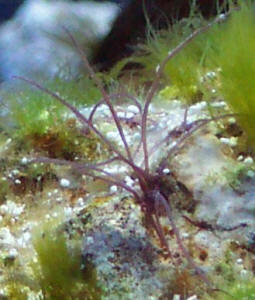 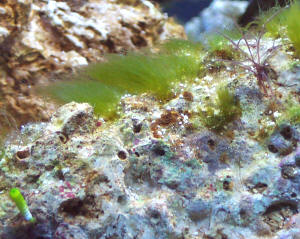
|
Re: Identifying very young anemone (Aiptasia?)
3/21/11
>> I'd like to snip a piece off and take a look-see under
a scope <<
Bob - Well, if you thought it would keep through the mail, I'd
be happy to mail you a piece. Let me know.
<Mmm, do take a quick read here: http://wetwebmedia.com/microscopfaqs.htm>
I do have a decent microscope, but I have no idea what to look
for.
Unfortunately, it's an old-fashioned scope with no attached
digital camera, so I can't send you a photo. I do want to buy
one of those some day. More toys!
<As you'll see the "QX" series of scopes is really
affordable... I have/use one.>
Anyhow, you seem fairly confident that it's not Aiptasia, so
I'll just let it go. When it gets significantly bigger I'll
send another photo, and maybe it will be more clear then.
<If it's akin to some things I've seen like this before,
it will stay the same size, perhaps laterally multiply. Not
detrimental chemically or physically>
My inexperienced gut tells me that it's a plant, even though
it's not green. Just the way all of those tendrils converge to
a single holdfast point makes it resemble a plant.
Tim
<Cheers, BobF>
Re: Identifying very young anemone (Aiptasia?)
3/22/11
Bob - Well, you inspired me to buy another toy. :) I did an online
search for computer microscopes, and I found one that costs about
twice what a QX costs but has much higher digital resolution (the
CCD sensor). As my long-suffering wife knows all too well, I tend
to solve problems by throwing money at them. Anyhow, when it
arrives I'll snip a piece of that mystery thing and try my hand
at a photo-micrograph of it, and send it to you.
Tim
<Sounds good. Thank you, BobF> |
|
Request your help to ID algae 1/26/11
Dear WWM:
<Chris>
I've noticed what seems to be some sort of macroalgae growing
in different spots on the live rock in my tank. I couldn't
find any pictures resembling it on either your site or in Julian
Sprung's "Algae" book. I've had Caulerpa
taxifolia and Valonia show up a couple times before, and it looks
nothing like that. From the attached photo, can you tell me what
it is, if it poses any detriment to the tank inhabitants (soft
and LPS corals), and if so, the best method of removal?
Chris
<Mmm, is this laminar (flat, blade-like), two-dimensional or
more "tubular" in cross section. Appears to be a Codium
sp. to me (great common name, "Dead Sailor's
Fingers"... can be easily excised close to the point of
attachment... but not terribly invasive, fast-growing. Put
another way, I'd leave, and enjoy it. Bob Fenner>
|
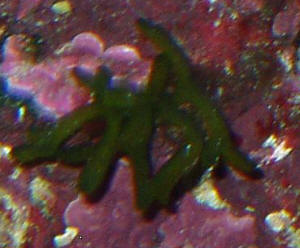 |
Re: Request your
help to ID algae 1/26/11
Definitely "tubular" in shape. I searched Codium sp.
algae pics online...yes, looks just like that! Thanks so much for
your help.
<Glad to assist you, BobF> |
|
Nuisance Microalgae 1/10/11
Hello WWM,
<Adam>
I have been having a rough time with an unknown algae for the
good part of a year now, and have done what research I could and
have not found any good info on this specific algae, so I am
turning to you guys for some advice.
I have a 5 foot 120G, with a 60G fuge and 40G sump in the
basement. Run 3 250w MH bulbs, 6.5 hours a day.
<This is a bunch of light, though I'd reduce the
intensity, increase the photoperiod>
SG 1.026, temp 78, ca 440, Alk 7 [2 part
dosing], no nitrates or phosphates on my API tests (those I
suppose they are there.) Flow from 2 vortechs set a 100%, skimmer
octo 200 recirc, and I run a Deltec mce 600. I run BRS carbon,
and GFO.
<I would ditch the GFO... your photosynthates need soluble
phosphate...>
I run your standard SPS reef tank, SPS grown fine, colour could
be better, but no huge issues. I have a medium bioload, 2 clowns,
2 Lyretail, 1 2" hippo tang, 2 mandarins, midas blenny,
royal gramma, orchid Dottyback, and a Multibarred angel.
The tank has been up for over 1.5 years now, and this algae has
been stifling my liverock for probably a good year now. The algae
is brown, definitely photosynthetic, since it wont grow in the
shade, will grow in high or low flow, is hard to remove from the
rock, and is extremely quick growing.
<I see this in your images... and from your descriptions, this
is almost assuredly principally a Cyanobacteria...>
I feed very little to try and keep it in check, a pinch of
pellets, or some rinsed Mysis everyday. I also have been dosing
vodka for the past 2 months, I am dosing 5ml a day now. I cut
back from 10ml a day, because my tank started produce a strong
fishy smell. Since the vodka dosing, the Chaeto in my sump
stopped growing, and has remained the same size.
<I'd keep the light on this green algae in your sump all
the hours the lights are off on the main display>
No snails I have tried will eat it, I syphon it off the rocks
when I do a water change and it is back in a couple days, it is
impossible to clean it all off. The rock was dry Marco rock
seeded with LR. I understand that if I were to control my nitrate
and phosphate better it would have to die,
<Not ahead of your photosynthetic livestock, no>
however if I fed any less I do not think my fish would be
healthy. I change approximately 30G of water every 2 weeks
[Instant Ocean].
<Good>
I do notice that if I do not syphon it off the rock, it will grow
until a certain point, turn black, fall off, and start the cycle
again.
<Oh yes>
Do I do a three day dark period?
<Not of use here>
I am worried for my corals, though perhaps I shouldn't be. I
am not sure what else I can do. Is there some magic animal that
will eat it?
<Not likely, no>
I have even brushed the LR with a toothbrush to no avail.
Help please, what is this algae, and what else can I do?
<Is a BGA... a few paths to improve your situation are
available... I'd take a few of them simultaneously. For one,
look into improving your RedOx... also, I'd make the sump
into a DSB w/ fine aragonitic sand...>
Adam
<Please peruse these articles: http://wetwebmedia.com/bluegralgae.htm
and http://wetwebmedia.com/SystemPIX/RedOx/RedoxPPTpres1.htm
and the linked files above. You can "win this battle",
with a bit of understanding, application of tried/true
technology. Bob Fenner>
Images--
http://farm6.static.flickr.com/5169/5341349931_937f60afe0_z.jpg
http://farm6.static.flickr.com/5129/5341348407_110514b9b2_z.jpg
http://farm6.static.flickr.com/5049/5341346897_b78b1b4df8_z.jpg
http://farm6.static.flickr.com/5168/5341345471_8f408bf2a3_z.jpg
|
  |
Re: Nuisance Microalgae <<RMF>>
1/10/11
Hello WWM,
> <Adam>
> I have been having a rough time with an unknown algae for
the good part
of a year now, and have done what research I could and have not
found any
good info on this specific algae, so I am turning to you guys for
some
advice.
> I have a 5 foot 120G, with a 60G fuge and 40G sump in the
basement. Run
3 250w MH bulbs, 6.5 hours a day.
> <This is a bunch of light, though I'd reduce the
intensity, increase the
> photoperiod>
>
-->It a a 3 bulb pendant light, I could turn the middle bulb
off for a
while
and see what happens.
<<I would>>
> SG 1.026, temp 78, ca 440, Alk 7 [2 part
> dosing], no nitrates or phosphates on my API tests (those I
suppose they
> are
> there.) Flow from 2 vortechs set a 100%, skimmer octo 200
recirc, and I
> run
> a Deltec mce 600. I run BRS carbon, and GFO.
> <I would ditch the GFO... your photosynthates need
soluble phosphate...>
--> Done
> I run your standard SPS reef tank, SPS grown fine, colour
could be
better,
> but no huge issues. I have a medium bioload, 2 clowns, 2
Lyretail, 1 2"
> hippo tang, 2 mandarins, midas blenny, royal gramma, orchid
Dottyback,
and
> a
> Multibarred angel.
> The tank has been up for over 1.5 years now, and this algae
has been
> stifling my liverock for probably a good year now. The algae
is brown,
> definitely photosynthetic, since it wont grow in the shade,
will grow
in
> high or low flow, is hard to remove from the rock, and is
extremely
quick
> growing.
> <I see this in your images... and from your descriptions,
this is almost
> assuredly principally a Cyanobacteria...>
-->I did have some red Cyano in the beginning, but I have no
seen any in a
long while
<<... Please read where you were referred... NOT all BGA
are red...>>
> I feed very little to try and keep it in check, a pinch of
pellets, or
> some
> rinsed Mysis everyday. I also have been dosing vodka for the
past 2
> months,
> I am dosing 5ml a day now. I cut back from 10ml a day,
because my tank
> started produce a strong fishy smell. Since the vodka
dosing, the Chaeto
> in
> my sump stopped growing, and has remained the same size.
> <I'd keep the light on this green algae in your sump
all the hours the
> lights are off on the main display>
--->already on a reverse photoperiod
<<Okay>>
> No snails I have tried will eat it, I syphon it off the
rocks when I do
a
> water change and it is back in a couple days, it is
impossible to clean
it
> all off. The rock was dry Marco rock seeded with LR. I
understand that
if
> I
> were to control my nitrate and phosphate better it would
have to die,
> <Not ahead of your photosynthetic livestock, no>
> however if I fed any less I do not think my fish would be
healthy. I
> change
> approximately 30G of water every 2 weeks [Instant
Ocean].
> <Good>
> I do notice that if I do not syphon it off the rock, it will
grow until
a
> certain point, turn black, fall off, and start the cycle
again.
> <Oh yes>
> Do I do a three day dark period?
> <Not of use here>
> I am worried for my corals, though perhaps
> I shouldn't be. I am not sure what else I can do. Is
there some magic
> animal
> that will eat it?
> <Not likely, no>
> I have even brushed the LR with a toothbrush to no
avail.
> Help please, what is this algae, and what else can I do?
> <Is a BGA... a few paths to improve your situation are
available... I'd
> take a few of them simultaneously. For one, look into
improving your
> RedOx... also, I'd make the sump into a DSB w/ fine
aragonitic sand...>
> Adam
-->My ORP is 474 at the moment,
<<Whoa! I would not have it this high>>
I do not think I could get it higher, I
suppose I could buy an ozone producer
-->I Only have a SSB in the display, what Ill do is make a DSB
in my 60G
fuge, I think that should be sufficient.
> <Please peruse these articles:
http://wetwebmedia.com/bluegralgae.htm
> and
http://wetwebmedia.com/SystemPIX/RedOx/RedoxPPTpres1.htm
> and the linked files above. You can "win this
battle", with a bit of
> understanding, application of tried/true technology. Bob
Fenner>
> Images--
>
http://farm6.static.flickr.com/5169/5341349931_937f60afe0_z.jpg
>
http://farm6.static.flickr.com/5129/5341348407_110514b9b2_z.jpg
>
http://farm6.static.flickr.com/5049/5341346897_b78b1b4df8_z.jpg
>
http://farm6.static.flickr.com/5168/5341345471_8f408bf2a3_z.jpg
<<BobF>>
Re: Nuisance Microalgae 1/10/11
Thanks for all the great help.
Adam
<Certainly welcome Adam. BobF>
|
|
|

